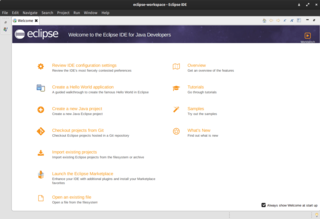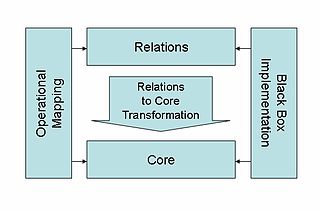The XML Metadata Interchange (XMI) is an Object Management Group (OMG) standard for exchanging metadata information via Extensible Markup Language (XML).

The Meta-Object Facility (MOF) is an Object Management Group (OMG) standard for model-driven engineering. Its purpose is to provide a type system for entities in the CORBA architecture and a set of interfaces through which those types can be created and manipulated. The official reference page may be found at OMG's website.

Eclipse is an integrated development environment (IDE) used in computer programming. It contains a base workspace and an extensible plug-in system for customizing the environment. It is the second-most-popular IDE for Java development, and, until 2016, was the most popular. Eclipse is written mostly in Java and its primary use is for developing Java applications, but it may also be used to develop applications in other programming languages via plug-ins, including Ada, ABAP, C, C++, C#, Clojure, COBOL, D, Erlang, Fortran, Groovy, Haskell, JavaScript, Julia, Lasso, Lua, NATURAL, Perl, PHP, Prolog, Python, R, Ruby, Rust, Scala, and Scheme. It can also be used to develop documents with LaTeX and packages for the software Mathematica. Development environments include the Eclipse Java development tools (JDT) for Java and Scala, Eclipse CDT for C/C++, and Eclipse PDT for PHP, among others.
Model Driven Architecture (MDA) is a software design approach for the development of software systems. It provides a set of guidelines for the structuring of specifications, which are expressed as models. Model Driven Architecture is a kind of domain engineering, and supports model-driven engineering of software systems. It was launched by the Object Management Group (OMG) in 2001.
The Object Constraint Language (OCL) is a declarative language describing rules applying to Unified Modeling Language (UML) models developed at IBM and is now part of the UML standard. Initially, OCL was merely a formal specification language extension for UML. OCL may now be used with any Meta-Object Facility (MOF) Object Management Group (OMG) meta-model, including UML. The Object Constraint Language is a precise text language that provides constraint and object query expressions on any MOF model or meta-model that cannot otherwise be expressed by diagrammatic notation. OCL is a key component of the new OMG standard recommendation for transforming models, the Queries/Views/Transformations (QVT) specification.
Given that metadata is a set of descriptive, structural and administrative data about a group of computer data, Java Metadata Interface is a platform-neutral specification that defines the creation, storage, access, lookup and exchange of metadata in the Java programming language.
The common warehouse metamodel (CWM) defines a specification for modeling metadata for relational, non-relational, multi-dimensional, and most other objects found in a data warehousing environment. The specification is released and owned by the Object Management Group, which also claims a trademark in the use of "CWM".

A metamodel or surrogate model is a model of a model, and metamodeling is the process of generating such metamodels. Thus metamodeling or meta-modeling is the analysis, construction and development of the frames, rules, constraints, models and theories applicable and useful for modeling a predefined class of problems. As its name implies, this concept applies the notions of meta- and modeling in software engineering and systems engineering. Metamodels are of many types and have diverse applications.
Apache Beehive is a discontinued Java Application Framework that was designed to simplify the development of Java EE-based applications. It makes use of various open-source projects at Apache such as XMLBeans. It leverages innovations in Java 5 which include JSR-175, which is a facility for annotating fields, methods and classes so that they can be treated in special ways by runtime tools. It builds on the framework developed for BEA Systems Weblogic Workshop for its 8.1 series. BEA later decided to donate the code to Apache.
Domain-specific modeling (DSM) is a software engineering methodology for designing and developing systems, such as computer software. It involves systematic use of a domain-specific language to represent the various facets of a system.
Model-driven engineering (MDE) is a software development methodology that focuses on creating and exploiting domain models, which are conceptual models of all the topics related to a specific problem. Hence, it highlights and aims at abstract representations of the knowledge and activities that govern a particular application domain, rather than the computing concepts.

ATL is a model transformation language and toolkit developed and maintained by OBEO and AtlanMod. It was initiated by the AtlanMod team. In the field of Model-Driven Engineering (MDE), ATL provides ways to produce a set of target models from a set of source models.

QVT (Query/View/Transformation) is a standard set of languages for model transformation defined by the Object Management Group.
Tefkat is a Model Transformation Language and a model transformation engine. The language is based on F-logic and the theory of stratified logic programs. The engine is an Eclipse plug-in for the Eclipse Modeling Framework (EMF).

SmartQVT is a full Java open-source implementation of the QTV-Operational language which is dedicated to express model-to-model transformations. This tool compiles QVT transformations into Java programs to be able to run QVT transformations. The compiled Java programs are EMF-based applications. It is provided as Eclipse plug-ins running on top of the EMF metamodeling framework and is licensed under EPL.
Knowledge Discovery Metamodel (KDM) is a publicly available specification from the Object Management Group (OMG). KDM is a common intermediate representation for existing software systems and their operating environments, that defines common metadata required for deep semantic integration of Application Lifecycle Management tools. KDM was designed as the OMG's foundation for software modernization, IT portfolio management and software assurance. KDM uses OMG's Meta-Object Facility to define an XMI interchange format between tools that work with existing software as well as an abstract interface (API) for the next-generation assurance and modernization tools. KDM standardizes existing approaches to knowledge discovery in software engineering artifacts, also known as software mining.
Connected Data Objects (CDO) is a free implementation of a Distributed Shared Model on top of the Eclipse Modeling Framework (EMF).
Acceleo is an open-source code generator from the Eclipse Foundation that allows people to use a model-driven approach to building applications. It is an implementation of the "MOFM2T" standard, from the Object Management Group (OMG), for performing model-to-text transformation.





